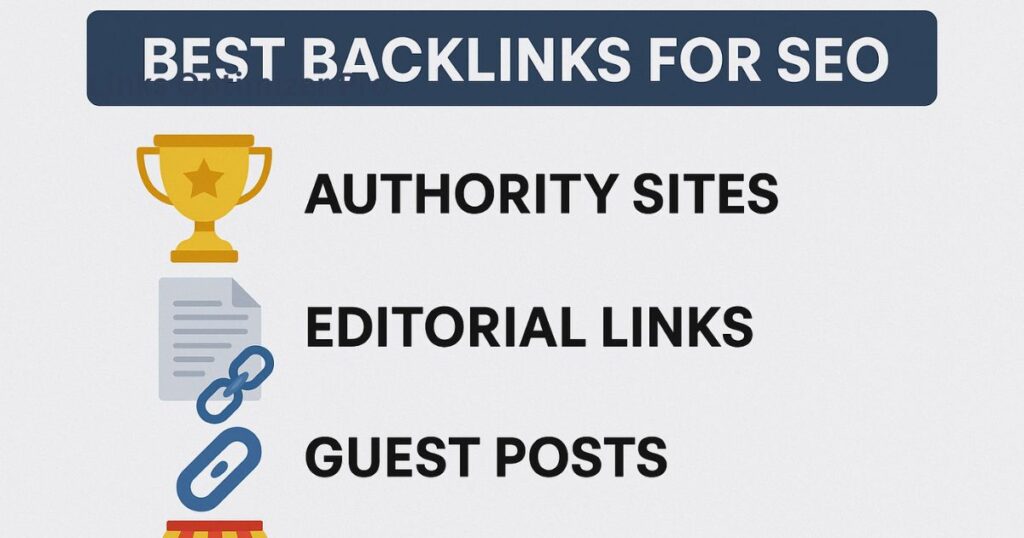Introduction: Why Backlinks Are Crucial for SEO
Backlinks are like votes of trust from one website to another. When a high-authority site links to your content, it tells search engines that your page is valuable and credible. As a result, your website climbs higher in search engine rankings.
But not all backlinks are created equal. Some can power up your SEO, while others may hurt it. Knowing the best backlinks for SEO helps you grow your site safely and effectively.
Editorial Backlinks: The Gold Standard
What Are Editorial Backlinks?
Editorial backlinks are links that come naturally from other websites because they find your content valuable. These are not paid or requested links. For example, a blogger might reference your article in their post because it provides useful information.
Why They’re Powerful
- Google loves them – They’re earned, not bought.
- High trust factor – Often comes from well-respected sites.
- Organic traffic boost – These links attract real readers.
How to Get Them
- Publish original, high-quality content.
- Use stats, case studies, and expert quotes.
- Promote your content to bloggers and journalists.
Guest Post Backlinks: Strategic and Effective
What Are Guest Post Links?
These are backlinks you earn by writing articles for other websites in your niche. In return, they allow you to link back to your site (usually in the author bio or content body).
Why They Work
- You control the anchor text and placement.
- Builds relationships and authority in your niche.
- Gets you traffic and SEO value at the same time.
Best Practices
- Write for high-authority, niche-relevant blogs.
- Avoid spammy guest post networks.
- Ensure your content is valuable, not just promotional.
Niche Edits or Contextual Links
What Are They?
Niche edits (also known as curated links) are backlinks placed into existing content on relevant websites. The content is already indexed and trusted by Google, so your link gets SEO value quickly.
Why They’re Among the Best Backlinks for SEO
- Quick impact on rankings
- Contextually relevant
- High authority if done right
How to Get Them
- Reach out to site owners offering value in exchange.
- Work with reputable link-building agencies.
- Avoid black-hat tactics; always go white-hat.
Business Profile and Directory Backlinks
What Are They?
These backlinks come from creating profiles on reputable directories and business listings like:
- Google Business Profile
- Yelp
- Crunchbase
- Trustpilot
Why They Matter
- Help with local SEO
- Build brand credibility
- Easy to acquire
Pro Tip
Stick to well-known directories. Avoid spammy ones as they can harm your rankings.
Resource Page and Listicle Links

What Are They?
These are backlinks from web pages that list helpful tools, articles, or services. For example, a blog post titled “Top 10 SEO Tools” may link to your tool if it’s relevant and useful.
How to Secure Them
- Find listicles in your niche using Google search (e.g., “best SEO blogs”).
- Pitch your content or tool for inclusion.
- Make sure your site looks professional and authoritative.
HARO and PR Links
What Are HARO Links?
HARO (Help a Reporter Out) connects journalists with expert sources. If your quote gets used in their article, they often link to your site.
Why These Are the Best Backlinks for SEO
- Come from top-tier sites like Forbes, Business Insider, etc.
- Highly authoritative and hard to replicate
- Builds your personal and brand reputation
How to Start
- Sign up at HelpAReporter.com
- Answer relevant journalist queries
- Respond quickly and professionally
Internal Linking: Don’t Ignore This Powerhouse
While not technically “backlinks,” internal links improve user experience and SEO. They help Google understand your site structure and pass authority across your pages.
Tips:
- Link from older posts to newer ones
- Use descriptive anchor text
- Keep it natural — don’t overdo it
Conclusion: Build Smart, Rank Higher
To win the SEO game, you don’t just need backlinks; you need the right backlinks. The best backlinks for SEO are those that come from trusted, relevant, and authoritative sources.
Focus on quality over quantity. A few powerful links from the right places can do more than hundreds of weak ones. Whether you’re earning editorial links, contributing guest posts, or answering HARO queries — your goal should be long-term SEO growth.


